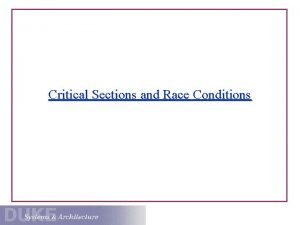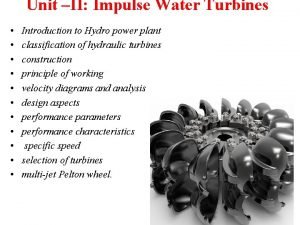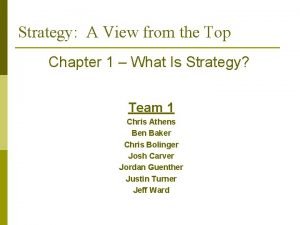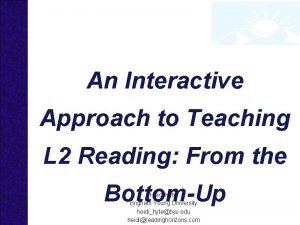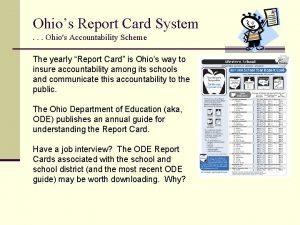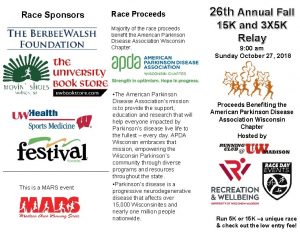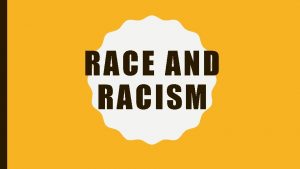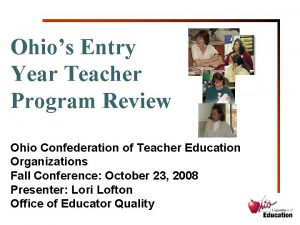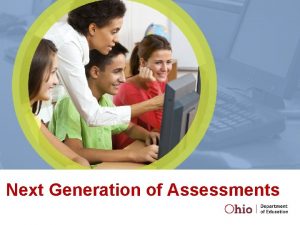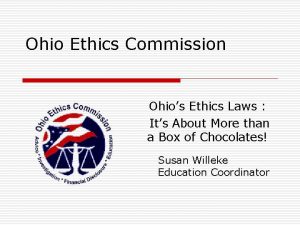Ohios Race To The Top Strategy Ohio is




































- Slides: 36

Ohio’s Race To The Top Strategy Ohio is committed to delivering accelerated, measurable results in order to transform the current educational system.

Four-year goals for Ohio’s Rtt. T program

Goal 1: Increasing high school graduation rate by 0. 5% per year state wide. Goal 2: Reducing the graduation rate gaps between underrepresented and majority students. Goal 3: Reducing the performance gaps by 50% on national and statewide assessments between underrepresented and majority students. Goal 4: Reducing the gap between Ohio and the bestperforming states in the nation by 50% on reading and mathematics proficiency as measured by national assessments.

Four-year goals for Indian Valley’s Rtt. T Goal 1: Achieve Ohio’s goals where they fit into our program district. Goal 2: Assure our staff is prepared for the transition to the revised state standards for the 2014 -2015 school year. Goal 3: Enhance our district’s use of technology and data for analysis of our students’ performance on assessments. Goal 4: Achieve these goals while maintaining an excellent working relationship between the IVTA and the District representation.

Standards and Assessments Assurance Area B: Becka Hicks

WHY? ? House Bill 1 Need for greater coherence, focus, and rigor in order for students to be college and career ready Educators indicated a need for improvement to the standards we currently work under

Stakeholder Needs—June 2009 Improvement needed or critical in all areas! 7


Our Plan for Standards: v. Transition to revised and Core Standards over the next four years so that they are fully implemented in the 2014 -2015 school year, as required by ODE v. May 27 Waiver Day sessions

Our Plan for Standards: Transition includes: v teacher training on changes in content v examination of current materials to see what lessons can be used and in what areas units will need to be built v utilize resources being provided by the state at no charge to Rtt. T districts, such as Standards Crosswalk documents and Model Curricula v Fill the gaps between our current resources and the revised/Core standards

Transition for 2014 -2015 CORE Standards What does this mean for the students and the curriculum each year? 2010 -11 2011 -12 2012 -13 2013 -14 2014 -15 New Assessments Begin Pre-K 3 rd grade 3 rd Grade OAA 4 th Grade OAA 5 th grade K 1 st grade 2 nd grade 3 rd Grade OAA 4 th Grade OAA 5 th Grade OAA 6 th grade 3 rd grade 4 th Grade OAA 5 th Grade OAA 6 th Grade OAA 7 th grade 4 th grade 5 th Grade OAA 6 th Grade OAA 7 th Grade OAA 8 th grade 5 th grade 6 th Grade OAA 7 th Grade OAA 8 th Grade OAA 9 th grade 6 th grade 7 th Grade OAA 8 th Grade OAA 7 th grade 8 th Grade OAA 10 th grade 10 th Grade OGT 11 th grade

Our Plan for Assessments: 1. Ensure that staff is aware of the format that new assessments will have as of 2014 -2015. This information will be shared as final decisions are made by the Ohio Department of Education. Work will formally begin on the new assessment system in May of this year. ODE is looking for educators to volunteer to participate in this work. 2. Staff training to prepare for: * expansion of the Kindergarten Readiness Test. * use of formative assessment, authentic assessment, performance assessment, computerized assessment * providing feedback to students so they can improve their performance

Changes to Assessment Format v K-8 Assessment Changes: Combine reading and writing into English Language Arts test Establish 3 performance levels instead of 5 currently being used v High School Changes: Changes Use of nationally standardized test Series of end-of-course exams Senior project

Changes to Assessment Format v Test Administration Changes: Ohio is involved with the PARCC and SMARTER consortia in order to use technology to administer new assessments Both include: Interim and summative components End-of-course vs. End-of-year test Rapid reporting system to inform instruction Teacher involvement in developing and scoring tests Item types such as multiple choice, extended response, technology-enhanced, and performance tasks *ODE will make the final decision as to which consortium to use

Using Data to Improve Instruction Assurance Area C: Ryan Burrier

• To Goals of Assurance Area C: Using Data to Improve Instruction have a fully functional Instructional Improvement System (IIS) in ALL classrooms. • To continue to improve and implement formative assessment programs currently in use. • To continue to commit to partnering with institutions of higher education to evaluate and implement innovative education models.

What is an Instructional Improvement System? (IIS) • An IIS means tools that provide teachers, principals, and administrators with meaningful support for a cycle of continuous instructional improvement, including activities such as: -Instructional planning -Gathering information -Interim assessments -Analyzing information with the support of rapid-time reporting -Using the information to inform decisions on appropriate NEXT STEPS v This truly captures DATA DRIVEN DECISION MAKING

What is formative assessment? • Formative Assessment is part of the instructional process. When incorporated into classroom practice, it provides the information needed to adjust teaching and learning while they are happening. • One distinction is to think of formative assessment as "practice. " Teachers do not hold students accountable in "grade book fashion" for skills and concepts they have just been introduced to or are learning. Teachers must allow for practice. • Formative assessment helps teachers determine next steps during the learning process as the instruction approaches the summative assessment of student learning. • The IIS helps gather the formative assessment information in rapid-reporting time.

How do we meet these needs practically for staff? • Through People • Data Coordinator • Data Facilitators at each Building These two “roles” will work in unison with each other at both the building and district level. • Through Professional Development • We must invest and train our staff in how to use the IIS and Formative Assessment Tools. • This will take place over the 4 -year period with the goal of having all staff trained by the 2013 -2014 school year.

Partnerships Partnering with other schools in developing and implementing formative assessments. • Work collaboratively with the state and/or other Rtt. T districts to develop or strengthen what others have done. • Partnering with institutions of higher education to evaluate and help implement education models. •

Professional Development Complete Professional Development in the following areas: - Formative Assessment Pilot Programs - Content-Specific Formative Assessments - New “Revised” Standards •

Budget • The majority of our Rtt. T Funds are allocated to Assurance Area C: Using Data to Improve Instruction. In fact, over $200, 000 of the $266, 000 Indian Valley received is going towards this Assurance Area. •

Great Teachers and Leaders Assurance Area D: Paul Beucler and Ira Wentworth

LEA SCOPE OF WORK • Establish district project teams to work on the design of teacher and principal evaluations systems that include: • Annual evaluations. • The use of student growth measures as one of multiple factors. • The use of other state and federal criteria.

The State’s guidelines are under development, but the following tentative guidelines were presented at an ODE meeting on December 16. 1. The performance assessment system adopted by a school should align to the Standards for Ohio Educators. 2. The assessment should encourage and support the teacher’s mastery of the Ohio Standards. 3. The assessment should provide a clear statement of expectations for professional performance.

4. The evaluation process should be systematic and ongoing in order to promote professional growth and student learning. - Multiple assessments of teachers’ performance should be conducted over time by trained evaluators that may include peers. - The district should systematically communicate with teachers about the performance assessments. 5. The assessment system should take into account experience, skill, longevity and responsibility. 6. The assessment system should use a variety of measures to collect evidence. Formal and informal observations Portfolios Multiple measures of student progress Artifacts Teacher self-assessment

7. The assessment system should have three or four clearly defined levels of performance. 8. The results of the assessments should have specific and limited uses * By teachers to identify areas for professional growth. * By administrators for coaching and promoting teacher collaboration. Our design is to meet these requirements and create a assessment tool that is designed to help the teacher become a better professional by educating the teachers on best practices and training them to improve their skill levels.

Ohio's Principal Evaluation System - Similarities with other Ohio systems - Ohio Improvement Process - Resident Educator Program - Obtaining Master Teacher Status - Teacher Evaluation System

Three Components to the Principal Evaluation Model - Goal Setting - Formative - Summative Component

Goal Setting - No more than 2 or 3 written in to the tool at the start of the evaluation cycle - At least 1 related to student achievement - Aligned to district CIP

Formative - Ongoing feedback throughout the evaluation cycle - Walk through, observation, examining artifacts

Summative - Includes a scoring rubric - Differentiates at least 3 levels of performance - Ineffective - Effective - Highly Effective

Where Do We Go From Here? Janis Hunter

Race to the Top Districts � � � Originally, 538 Ohio districts submitted Memorandums of Understanding. 50 districts have dropped out of the process. Most of the “dropouts” are charter schools. 488 Schools remain. TUSCARAWAS COUNTY PARTICIPANTS: New Philadelphia City Schools Tuscarawas Valley Local Schools Indian Valley Local Schools

Next Steps? Spending $266, 414 in Rtt. T funds over a fouryear period. Implementing programs that will outlive the duration of Rtt. T funding. Beginning the work of the data facilitators. Providing necessary professional development in the Assurance areas. Keeping the staff, Board of Education and public continually updated.

Questions And Answers!
 Dams design
Dams design Data race vs race condition
Data race vs race condition Efficiency of pelton turbine
Efficiency of pelton turbine Listening strategies activities
Listening strategies activities Top-down approach in reading examples
Top-down approach in reading examples Strategy a view from the top
Strategy a view from the top Bottom up top down listening
Bottom up top down listening Bottom up approach in reading
Bottom up approach in reading Tư thế ngồi viết
Tư thế ngồi viết Thẻ vin
Thẻ vin Voi kéo gỗ như thế nào
Voi kéo gỗ như thế nào Thơ thất ngôn tứ tuyệt đường luật
Thơ thất ngôn tứ tuyệt đường luật Các châu lục và đại dương trên thế giới
Các châu lục và đại dương trên thế giới Từ ngữ thể hiện lòng nhân hậu
Từ ngữ thể hiện lòng nhân hậu Diễn thế sinh thái là
Diễn thế sinh thái là Vẽ hình chiếu vuông góc của vật thể sau
Vẽ hình chiếu vuông góc của vật thể sau Thế nào là giọng cùng tên? *
Thế nào là giọng cùng tên? * Phép trừ bù
Phép trừ bù Lời thề hippocrates
Lời thề hippocrates Khi nào hổ con có thể sống độc lập
Khi nào hổ con có thể sống độc lập Chụp phim tư thế worms-breton
Chụp phim tư thế worms-breton đại từ thay thế
đại từ thay thế Quá trình desamine hóa có thể tạo ra
Quá trình desamine hóa có thể tạo ra Công thức tính độ biến thiên đông lượng
Công thức tính độ biến thiên đông lượng Thế nào là mạng điện lắp đặt kiểu nổi
Thế nào là mạng điện lắp đặt kiểu nổi Dot
Dot Nguyên nhân của sự mỏi cơ sinh 8
Nguyên nhân của sự mỏi cơ sinh 8 Bổ thể
Bổ thể Vẽ hình chiếu đứng bằng cạnh của vật thể
Vẽ hình chiếu đứng bằng cạnh của vật thể Phản ứng thế ankan
Phản ứng thế ankan Các môn thể thao bắt đầu bằng tiếng bóng
Các môn thể thao bắt đầu bằng tiếng bóng Thiếu nhi thế giới liên hoan
Thiếu nhi thế giới liên hoan Sự nuôi và dạy con của hổ
Sự nuôi và dạy con của hổ Hát lên người ơi alleluia
Hát lên người ơi alleluia điện thế nghỉ
điện thế nghỉ Một số thể thơ truyền thống
Một số thể thơ truyền thống

